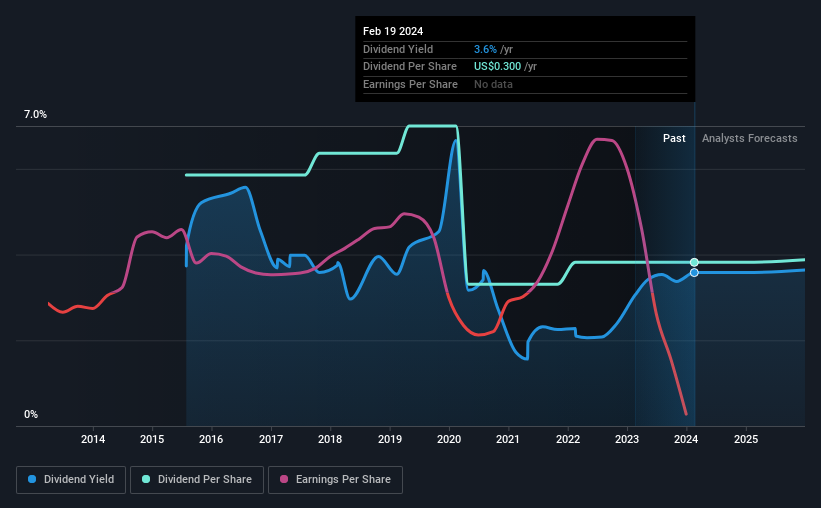Mercer International's (NASDAQ:MERC) Dividend Will Be $0.075
Mercer International Inc. (NASDAQ:MERC) has announced that it will pay a dividend of $0.075 per share on the 4th of April. Based on this payment, the dividend yield will be 3.6%, which is fairly typical for the industry.
View our latest analysis for Mercer International
Mercer International's Payment Has Solid Earnings Coverage
We like to see a healthy dividend yield, but that is only helpful to us if the payment can continue. Even though Mercer International is not generating a profit, it is still paying a dividend. The company is also yet to generate cash flow, so the dividend sustainability is definitely questionable.
Analysts expect a massive rise in earnings per share in the next year. If the dividend extends its recent trend, estimates say the dividend could reach 1.1%, which we would be comfortable to see continuing.
Mercer International's Dividend Has Lacked Consistency
Even in its relatively short history, the company has reduced the dividend at least once. This makes us cautious about the consistency of the dividend over a full economic cycle. Since 2015, the dividend has gone from $0.46 total annually to $0.30. This works out to be a decline of approximately 4.6% per year over that time. Generally, we don't like to see a dividend that has been declining over time as this can degrade shareholders' returns and indicate that the company may be running into problems.
Dividend Growth Is Doubtful
Growing earnings per share could be a mitigating factor when considering the past fluctuations in the dividend. Over the past five years, it looks as though Mercer International's EPS has declined at around 5.4% a year. If earnings continue declining, the company may have to make the difficult choice of reducing the dividend or even stopping it completely - the opposite of dividend growth. It's not all bad news though, as the earnings are predicted to rise over the next 12 months - we would just be a bit cautious until this can turn into a longer term trend.
Mercer International's Dividend Doesn't Look Great
Overall, while some might be pleased that the dividend wasn't cut, we think this may help Mercer International make more consistent payments in the future. The company's earnings aren't high enough to be making such big distributions, and it isn't backed up by strong growth or consistency either. Considering all of these factors, we wouldn't rely on this dividend if we wanted to live on the income.
Market movements attest to how highly valued a consistent dividend policy is compared to one which is more unpredictable. Meanwhile, despite the importance of dividend payments, they are not the only factors our readers should know when assessing a company. For example, we've picked out 3 warning signs for Mercer International that investors should know about before committing capital to this stock. If you are a dividend investor, you might also want to look at our curated list of high yield dividend stocks.
Have feedback on this article? Concerned about the content? Get in touch with us directly. Alternatively, email editorial-team (at) simplywallst.com.
This article by Simply Wall St is general in nature. We provide commentary based on historical data and analyst forecasts only using an unbiased methodology and our articles are not intended to be financial advice. It does not constitute a recommendation to buy or sell any stock, and does not take account of your objectives, or your financial situation. We aim to bring you long-term focused analysis driven by fundamental data. Note that our analysis may not factor in the latest price-sensitive company announcements or qualitative material. Simply Wall St has no position in any stocks mentioned.

 Yahoo Finance
Yahoo Finance 
